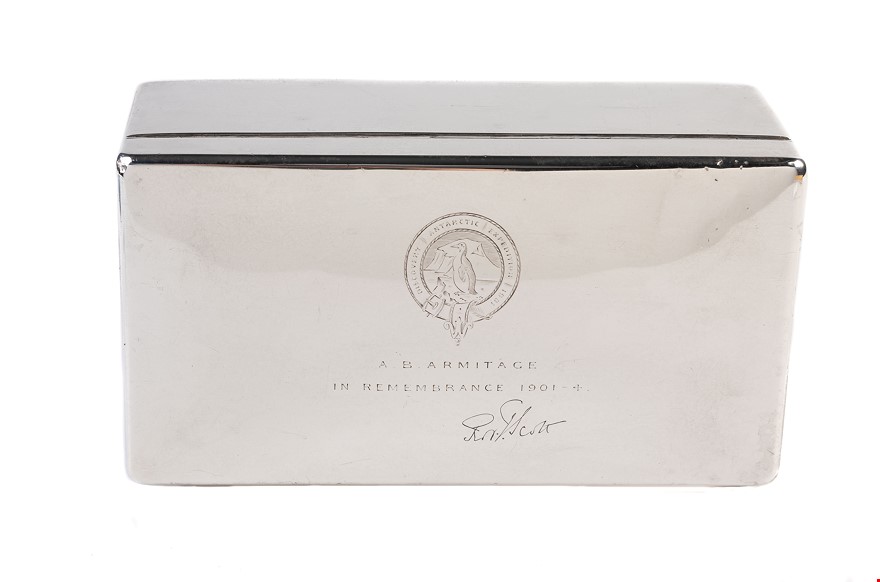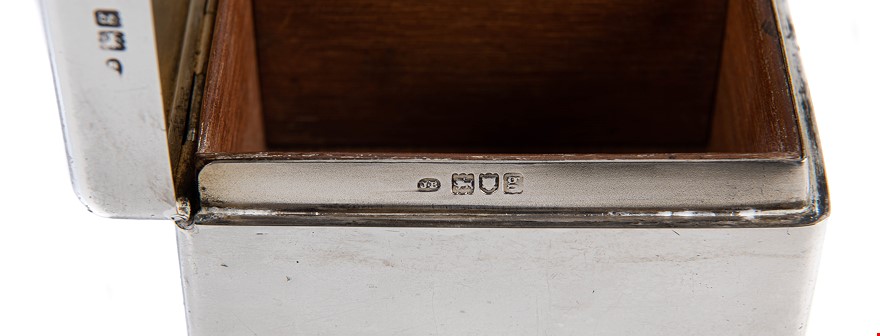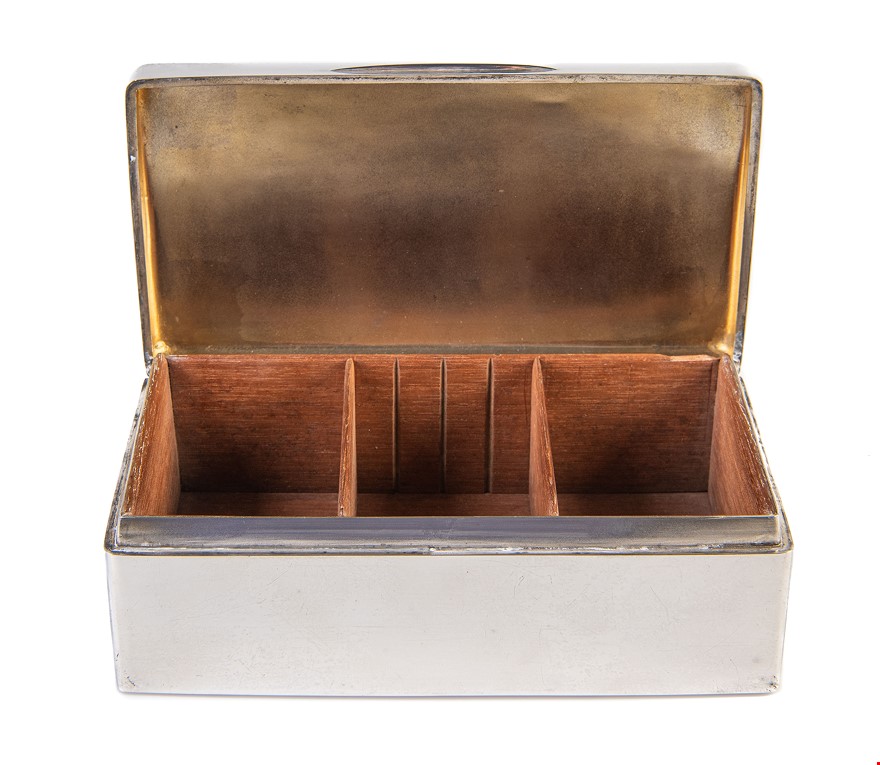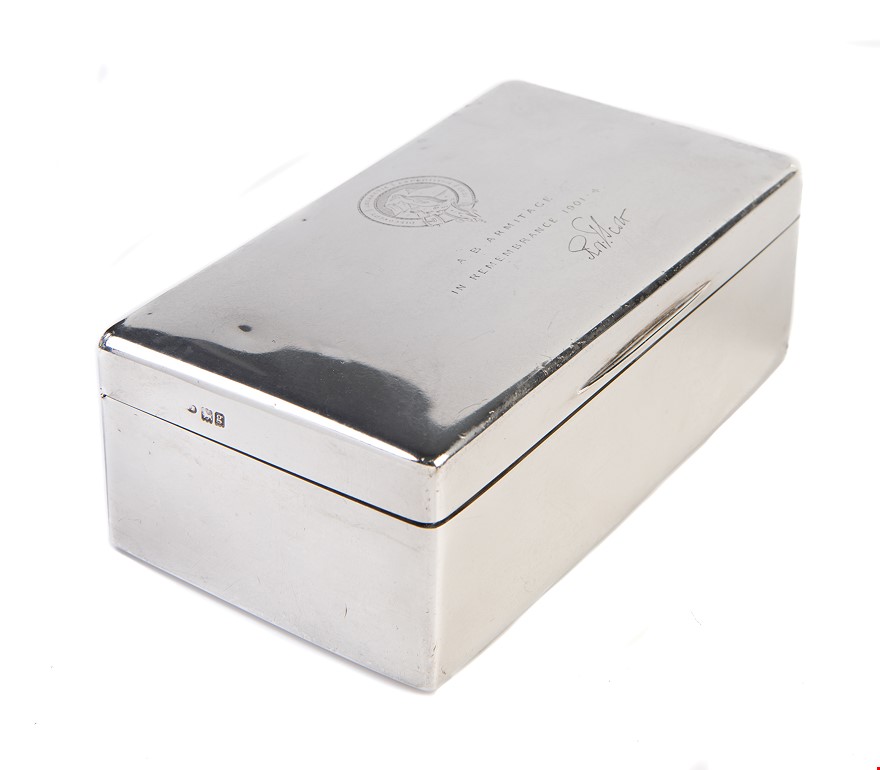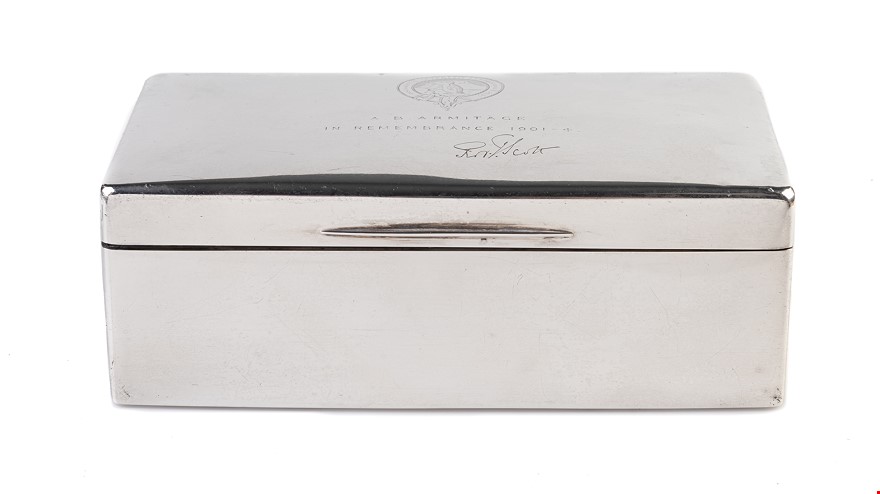Silver table cigarette box with engraved inscription from Robert Falcon Scott to Albert Armitage.
SCOTT Sir Robert Falcon. (1904.)
£15000.00
Please contact us in advance if you would like to view this book at our Curzon Street shop.
A GIFT FROM THE CAPTAIN
Oblong cedar-lined silver cigarette box, with hinged lid and adjustable compartment interior. 200 by 110 by 70mm. Engraved on the lid with the official penguin in garter crest of the "Discovery Antarctic Expedition 1901". Beneath is engraved "A. B. ARMITAGE / IN REMEMBRANCE 1901-04", followed by the engraved facsimile signature of Robert F. Scott. A few small dents, else very good. London hallmark for 1902, maker's mark of Joseph Braham, engraved retailer's name of Dobson Piccadilly,
A stately memento of the 1901-1904 British Antarctic Discovery Expedition, presented by the captain to his second-in-command.
Lieut. Albert Borlase Armitage (1864 - 1943) was the senior of ten officers on board the Discovery. Though he had trained in the Royal Navy, he spent much of his prior career serving in the Merchant Navy for the P&O Company. The British Antarctic Expedition was not his first foray into polar waters - he served between 1894 and 1897 as second-in-command of the Jackson-Harmsworth expedition to Franz Josef Land. Through a chance encounter on the ice, this expedition was also responsible for the rescue of Fridjof Nansen, stranded with a companion after leaving the icebound Fram. Armitage was recognised by the Royal Geographical Society with the Murchison Award upon his return.
His appointment as navigator for the Discovery got off to a promising start, and Armitage was responsible for the most important exploratory trip of the expedition, surveying the polar plateau on his Western Journey. He was the first man to set foot on this barren Antarctic plain, and his findings were invaluable for establishing the route of the polar party.
As the expedition got underway however, some friction developed between Armitage and the captain. Subsequent biographers have extrapolated these cracks into fissures, but whatever took place on the mission itself, neither Scott not Armitage publicly defamed the other at the time. Certain crew members however did not hold back when writing in their diaries about Armitage's behaviour surrounding the arrival of the relief ship SY Morning. After more than a year with little comfort beyond that which could be provided by the wardroom of the Discovery, the arrival of the Morning promised fresh supplies and crucially news from home. Armitage was part of the preliminary party to cross the ice and greet the relief ship, however upon embarkation, did not exactly rush back to the men awaiting their post. As Reginald Skelton noted in his diary "Armitage seemed rather callous about it, and took delight in 'hanging on'." (Crane, 236). It cannot have completely escaped Scott that after an otherwise harmonious year on the ice, the returning Southern Party came home to a ship under Armitage's command which was murmuring with discontent.
Upon the Discovery's return to England, Armitage was paid off but found himself with a nine-month wait for another merchant naval appointment. In order to make ends meet, he was granted permission to write a short popular account of his time in the Antarctic, to be put out just after Scott's official narrative. However, the weighty Voyage of the Discovery was slow in the making, and Armitage's publisher pipped it to the post in 1905. The revenue generated by these books was of great importance to the official expedition funds, and Scott's publishers fiercely defended their right to the scoop. Some heated letters were exchanged, all whilst Armitage was at sea on a new commission. According to Armitage's later autobiography Cadet to Commodore however, once he'd returned to London the matter was put to bed over a lunch between Scott and his former second-in-command, and "all was sunshine". This was the last time the two men were to meet, and there is a good chance that this cigarette box was given by Scott on this occasion.
A small handful of other such boxes survive, engraved to Captain Scott's specification for presentation to high ranking officers on his crew. We have traced examples given to Hartley T. Ferrer, Cyril Longhurst, and one to Ernest Shackleton, which sold at Christie's on 17 September 1999, lot 258, for £35,600.
Crane, David. Scott of the Antarctic. London, Harper Collins, 1997; Cf. Rosove, p22.
.
Stock Code: 243063
